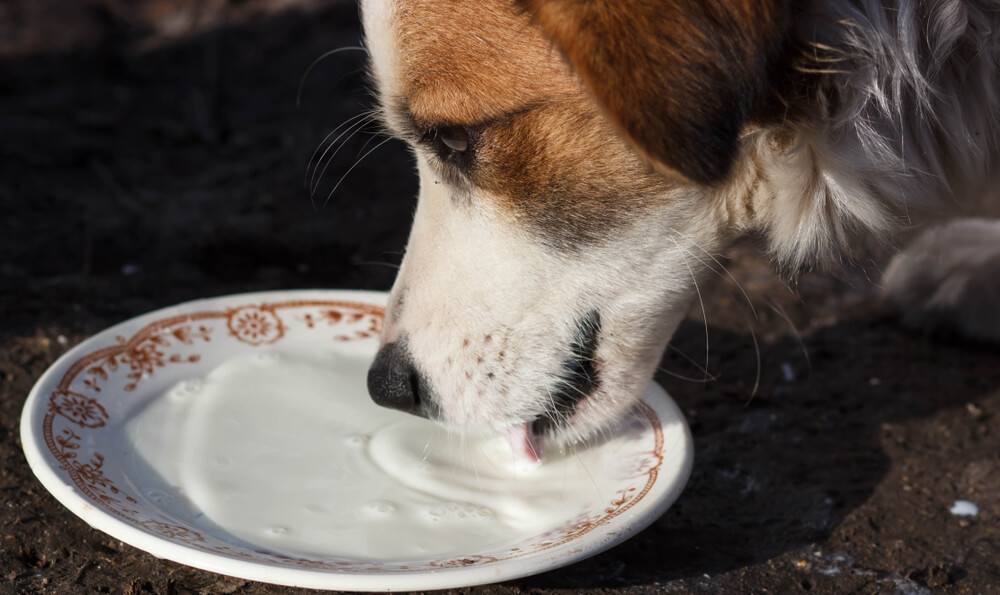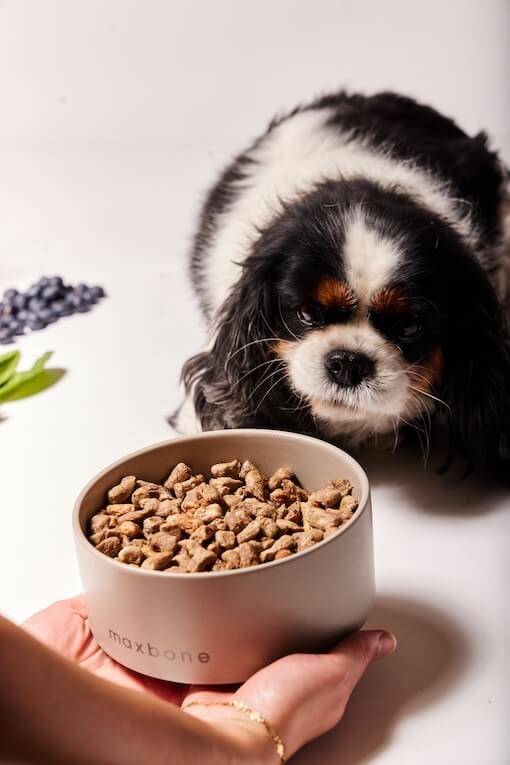
DogFoodAdvisor is reader supported See how
Dog Food Advisor is 100% impartial and is never paid to promote any brand. But if you buy using links on this page, we may earn a referral fee.
The short answer is that milk in small quantities is generally safe for dogs. This comes with a ‘but’… like humans, not all dogs are the same, and some will tolerate milk and dairy products better than others.
In this article we explain what milk dogs can drink, whether milk is bad for dogs and whether it’s ok for dogs to drink lactose-free milk.
It is also worth noting, that although milk is a means of nourishing baby mammals, in most cases the ability to digest milk (lactase) is lost after they reach maturity.
Is Milk Bad for Dogs?
Milk is safe for dogs to drink — it’s not toxic. It contains calcium and protein, which will benefit your dog, although if they’re already getting that from a balanced diet from their dog food, it will make minimal difference to their nutritional intake.
However, as milk is a dairy product containing high amounts of lactose, it may lead to digestive issues for some dogs who have a low tolerance to lactose.
The other factor to note about milk is most types of milk, including cow’s milk and goat’s milk, contain high levels of fat and sugar. This is another reason why you should think of milk as a treat for your dog, as too much of it can lead to weight gain and obesity, as well as potential health concerns including pancreatitis and diabetes.
What is Lactose?
Lactose is a type of sugar. One comprising two sugar molecules that are tightly linked to each other — galactose and glucose.
For your dog to safely consume dairy products, the lactose these foods contain must first be split into two digestible sugar molecules.
But to do that, the animal must be able to produce its own lactase, a natural enzyme that can split lactose into those two easy-to-digest sugars.
Adult dogs cannot produce enough lactase to digest milk. Humans are the only ones who continue to drink milk past infancy. Evolutionarily, there is no need for an adult animal to continue to digest milk. As dogs are scavengers their digestive capability is more flexible than other mammals (such as cats) but it is likely that milk, in any considerable quantity, will cause digestive upset in many dogs.
What is a Lactose Intolerance in Dogs?
Without this critical lactase enzyme, dogs struggle to digest dairy products.
This inability to produce lactase causes lactose intolerance.
This means that lactose-intolerant dogs struggle to digest lactose, and may experience digestional discomfort as a result. Some dogs will only experience mild symptoms, some more severe. These symptoms can include:
- Bloating
- Loss of appetite
- Increase in gas
- Loose stools
- Diarrhea
- Vomiting
The only way to know if your dog can tolerate lactose is to feed them a small amount as a test. Some dogs that are lactose intolerant can tolerate different types of dairy, such as cheese, as it contains less lactose.
What Milk Can Dogs Drink?
Dogs can drink small amounts of cow’s milk or goat’s milk if they can tolerate lactose. Milk alternatives or lactose-free alternatives such as soy, almond, oat, coconut or hazelnut are best avoided as not only do they contain high levels of fat, but some may contain sugars or sweeteners that are toxic to dogs, in particular xylitol.
If you need to hydrate your dog, the best, and safest, option is water.
What Milk Can Puppies Drink?
It is best to avoid cow’s milk for puppies because they are more likely to be susceptible to a lactose intolerance.
This is because the milk a mother dog produces for nourishing her puppies is different in its nutritional profile than the milk a cow produces. Canine milk contains higher contents of protein and a lower content of lactose compared to bovine and caprine milk.
Weaning puppies that need additional calories, however, can safely consume small amounts of plant-based milk such as soy milk, coconut milk, oat milk and almond milk. But, as mentioned, these milks could contain xylitol, so proceed with caution and make sure you read the labels carefully. Puppies are individual and so these milks could still potentially cause digestive upset in some.
Can a Dog Be Allergic to Milk?
Dogs can suffer allergies to the protein in milk.1
However, unlike digestive symptoms related to lactose intolerance, a true milk allergy is more likely to cause an immune reaction (such as itching or rash).
If your dog tends to suffer from gas, bloating or loose stools after consuming dairy products, it’s far more likely they’re lactose intolerant.
Are Cheese and Ice Cream Safe for Dogs?
If your dog has no lactose intolerance, they’ll have no problem eating cheese, ice cream or other dairy products.
Some dogs with mild lactose intolerance will also be able to consume these products without any ill effects, as they contain much less lactose than milk — particularly cheese.
However, this does not necessarily mean they should. Cheese is often used as a training treat, but be mindful of the calories being supplied here.
Pet parents often give their dogs ice cream in hot weather, but again ice cream is generally high in fat (and calories) as well as sugar, so is not a healthy option to give as a cooling treat.
Dairy, generally, is rich, so it is common that it causes upset digestion.
This table shows how some milk products contain only a tiny amount of lactose per serving. Please note these serving sizes are provided as a guide for humans (a cup of milk or ½ a cup of ice cream is a huge amount, especially for a small dog.)

Most “hard” cheeses contain only a tiny amount of lactose — about one gram or less per serving. In comparison, milk clocks in at a whopping 11 grams.
The lower the lactose content of a dairy product, the more likely your dog will be able to consume it without digestive upset.
So it’s probably a safe bet you can offer low-lactose (or lactose-free) dairy products to your dog.
This is why ice cream and milk are more likely to produce digestive upset than cheddar or Swiss cheese.
Any changes to a dog’s diet should be gradual, to allow the microbiome to adjust. Dogs who don’t already eat dairy regularly will not be used to it, and introducing dairy products quickly would be a recipe for an upset tummy. Also, for dogs susceptible to pancreatitis or requiring a low fat or light/ weight loss diet, dairy isn’t suitable.
Compare the Best
How does your current favorite compare with The Dog Food Advisor’s most recommended brands?
Final word
The Dog Food Advisor does not accept money, gifts, samples or other incentives in exchange for special consideration in preparing our reviews.
However, we do receive a referral fee from online retailers (like Chewy or Amazon) and from sellers of perishable pet food when readers click over to their websites from ours. This helps cover the cost of operation of our free blog. Thanks for your support.
For more information, please visit our Disclaimer and Disclosure page.
Article reviewed by
Laura Ward
Pet Nutritionist
Laura studied BSc (Hons) Animal Science with an accreditation in Nutrition at the University of Nottingham, before working for eight years in the pet food and nutrition industry.






